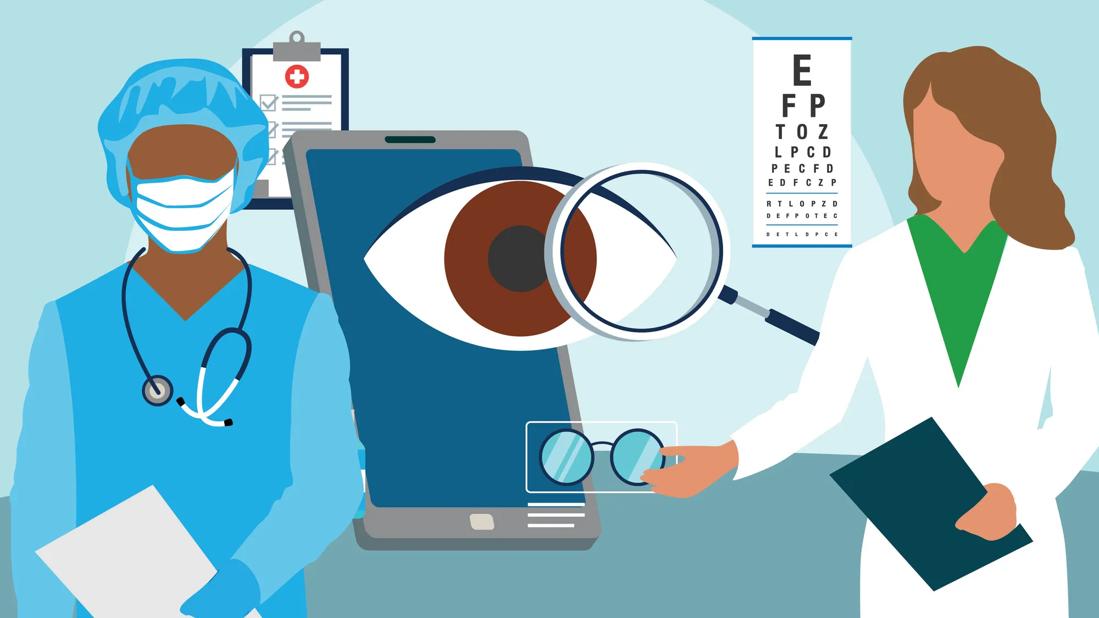The differences are few, but ophthalmologists can perform eye surgeries and more complex procedures

Image content: This image is available to view online.
View image online (https://assets.clevelandclinic.org/transform/440dc759-9b10-4d12-bbca-aa36d93eb44f/eye-exam-tools-optometrist-opthamologist-1327481670)
An ophthalmologist in scrubs, and optometrist prepping an eye exam
Your eyes have been bugging you. You’re wondering whether you should see an ophthalmologist or an optometrist. But treating common conditions, like dry eyes, is much different from treating more complex conditions, like removing cataracts.
Advertisement
Cleveland Clinic is a non-profit academic medical center. Advertising on our site helps support our mission. We do not endorse non-Cleveland Clinic products or services. Policy
Ophthalmologist Scott Wagenberg, MD, breaks down the difference between
ophthalmologists and optometrists and what each can help with in terms of medical treatment.
The differences between these eye specialists vary based on their level of expertise and the kinds of treatments and services they’re allowed to provide.
Optometrists provide routine, regular care related to eye health and vision. But ophthalmologists are more qualified. As a result, they can diagnose and treat a wider range of more complex conditions, like severe glaucoma or diabetes-related retinopathy.
Ophthalmology is a branch of medicine that focuses on the diagnosis and treatment of eye disorders. To become an ophthalmologist, you need to meet these criteria:
Advertisement
Optometry involves the physical examination of the eye to diagnose and treat issues that affect your eye health and vision. Optometrists must meet the following criteria:
Opticians work with ophthalmologists and optometrists to help you select and fit your prescription eyewear. Opticians help you choose the right glasses or contacts, including frames, lenses and coatings.
Opticians work directly from orders written by ophthalmologists or optometrists. They don’t give eye exams or write prescriptions themselves. “They don’t diagnose or treat eye problems at all,” says Dr. Wagenberg.
When you’re dealing with symptoms or immediate issues like blurry vision, eye pain or “floaters,” you can make an appointment with either an ophthalmologist or an optometrist. Any good eye doctor will help point you in the right direction if you need to see a different specialist.
“An optometrist will refer you to an ophthalmologist for any difficult medical conditions, like uncontrolled eye infections, medically unmanageable glaucoma, cataract surgery, corneal transplants or retinal problems,” says Dr. Wagenberg.
If you’re considering laser eye surgery (like LASIK), an ophthalmologist is your point of contact. But an optometrist is often a better fit for someone who needs contacts.
The best thing you can do for your eyes is get regular exams and protect your vision. In most cases, you should have an eye exam at least once a year, especially if you’re at higher risk of vision loss or diabetes or have a family history of eye disease.
Just remember that an optometrist is a good starting point for many. An ophthalmologist is often the next person you see when you need more refined treatments.
Advertisement

Sign up for our Health Essentials emails for expert guidance on nutrition, fitness, sleep, skin care and more.
Learn more about our editorial process.
Advertisement
You don’t have to wait until you have symptoms of heart disease to seek cardiology care
Having a PCP means knowing where to go for a range of concerns — that’s a good thing for your lifelong health
Anyone can call themselves a nutritionist, but dietitians have specialized training
The best way to figure out which kind you need is to first speak with your primary care provider
They practice medicine similarly, but DOs have a focus on the mind, body, spirit connection
The short answer from a primary care specialist
The Short Answer from one of our experts
Your first point of health contact
Prioritize your health by managing stress, strengthening your social connections and getting quality sleep
Bolsters, blankets, pillows and blocks can offer extra support, stability and comfort
Allergies, postnasal drip, asthma or reflux could be to blame for a cough that won’t quit